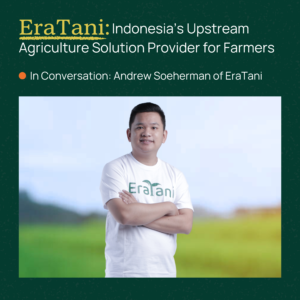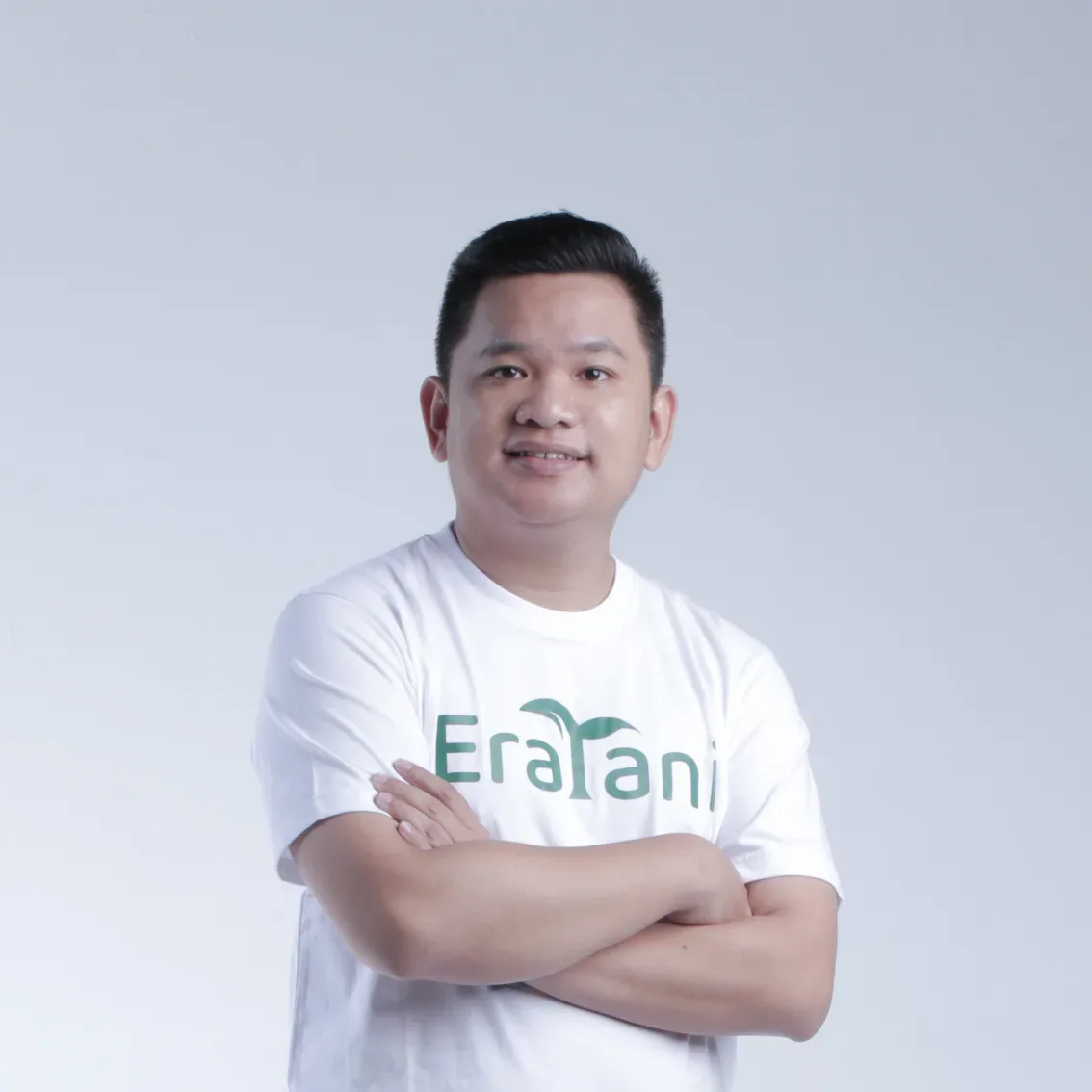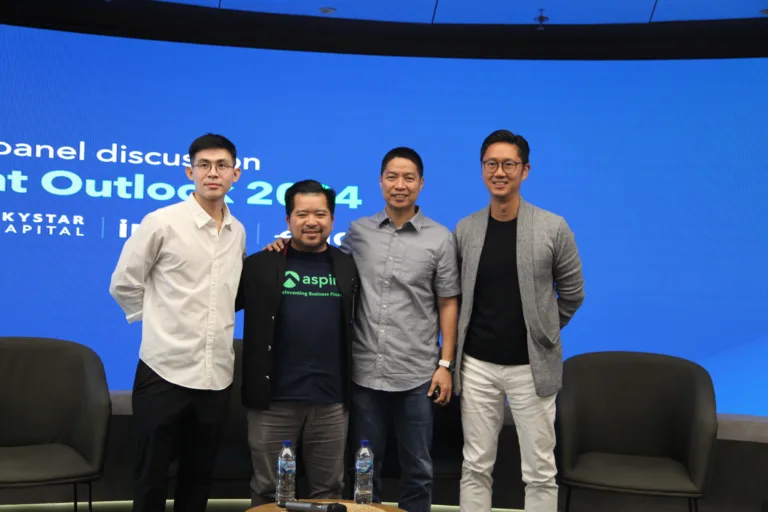
Today, we sat down with Andrew to talk about his journey supporting farmers through building EraTani, and how we see the agriculture market evolving in Indonesia.
With over 15 years of experience primarily focused on sales, Andrew’s journey began with selling tiles for a local construction materials company in Medan during his college days. This initial foray into sales ignited his passion and paved the way for impactful roles at renowned MNCs like PT Kao Indonesia, PT Sinar Sosro, PT Sony Mobile Communication, and PT LG Electronics Indonesia. Andrew’s proficiency in sales and strategic leadership was further honed during his tenure as the Strategic District Head of East Java at GOJEK, contributing to the company’s hyper-growth phase.
1. What is the story behind the creation of EraTani? What inspired its beginning?
The roots of EraTani trace back to my family background, which is deeply rooted in agriculture. One of my uncles owns an agri input plant in Medan, and another uncle is involved in the palm oil business.
In 2018, I joined GOJEK and lead its expansion in East Java. Despite my initial lack of knowledge about startups, the experience ignited my desire to contribute to projects with a significant social impact. Subsequently, I worked in the hospitality sector with OYO but the pandemic hit soon after, and I was laid off along with 600 other employees. I decided to take a six-month sabbatical.
During my sabbatical, my family and I experience difficulty finding quality agricultural products. Immediately, I was intrigued to delve deeper into the industry so I spent three months in the secondary cities of West Java, learning from farmers, identifying the issues, before selecting rice as our primary commodity focus.
Luckily, an introduction to an angel investor changed the trajectory. With a seed capital of $300,000, EraTani was born.
2. What are some insights into the specific hardships or gaps in the current agricultural landscape that EraTani aims to alleviate?
We divided the main challenges into two: Internal Challenges and Challenges for Stakeholders.
Internal Challenges
- Financial Constraints (Agri-Management): Addressing the lack of capital for farmers is fundamental to EraTani’s mission. By implementing financial support mechanisms, such as accessible credit programs and microfinance initiatives, we aim to empower farmers to directly invest in their operations.
- Knowledge Gap in Farming Practices (Agri-Management): Educational programs, workshops, and digital platforms are being utilized to provide insights into modern and sustainable farming techniques. This educational initiative enhances farmers’ skills, boosts productivity, and encourages the adoption of best practices.
- Access to Buyers (Agri-Output): Connecting farmers transparently and efficiently straight to their buyers is crucial to maximize profit and minimize cost. This is where technology come to play where digital platform is provided to mediate the end to end relationship and this reduces dependency on intermediaries, ensuring fair prices for their produce and a more equitable value distribution.
Challenges for Other Stakeholders (Kios and RMUs):
- Sales Coverage (Agri-Management): For other stakeholders in the agricultural sector, EraTani addresses the issue of limited sales coverage. This constraint impacts market reach and customer acquisition. Uneven access to suppliers further disrupts inventory management, and unreliable delivery services compound the challenges.
- Access to Capital: Short payment terms often strain cash flow for stakeholders, impeding necessary investments.
- Lack of Access to Raw Products: For Rice Milling Units (RMUs), the lack of access to raw products poses a significant challenge. Eratani recognizes this issue and is dedicated to finding solutions that ensure the feasibility of future buy and future sales, promoting the long-term viability of RMUs.
3. Why specifically rice out of all the commodities?
Prioritizing rice stems from strategic considerations, as rice is a single commodity widely consumed by most Indonesians if not all.
It is saddening that despite Indonesia having >10.5 million hectares of land suitable for paddy fields, the country is still one of the largest importers of rice due to the country’s low farming productivity.
We inherently believe that the market is huge and that we are not competing with local producers. In fact, we are taking an active role in empowering local farmers and producers to reduce the percentage of imported rice, where a couple of percentage points improvement would translate to hundreds of millions of dollars.
Furthermore, contrary to popular belief, rice farming could yield high margins provided we tap into the right segment in the supply chain. Those extra margins never hurt.
4. Agriculture is a dynamic sector with unforeseen challenges and opportunities. Can you shed light on some of these and how EraTani navigates them?
The agriculture sector is filled with both challenges and opportunities that demand a proactive and adaptive approach.
Some unforeseen challenges include:
- Climate Change: Unpredictable weather patterns and climate change pose ongoing challenges, impacting crop yields and farm operations.
- Market Volatility: Global economic shifts and geopolitical events can lead to price volatility for agricultural commodities, affecting farmers’ income and profitability.
- Pandemic Disruptions: Events like pandemics can disrupt supply chains, impact labor availability, and create market uncertainties, affecting the entire agriculture supply chain.
So, there are massive opportunities to unlock values with the help of:
- Technology Adoption in the Future: Advancements in AgTech, such as precision farming, drones, and AI, may offer increased efficiency, resource optimization, and data-driven decision-making in agriculture.
- Modern and Sustainable Agriculture Practices: Adopting modern and sustainable agricultural practices increases yield and future produce. Furthermore, the growing consumer demand for traceable and organic products presents opportunities for farmers to produce higher-value products for both domestic and international markets.
In the realm of unforeseen challenges, Trihill Capital has been instrumental in providing more than just financial support. The partnership with Trihill Capital has included:
- Opening Doors: Trihill Capital has a strong network of experienced CEOs, financial institutions, and impact funds, allowing EraTani to establish valuable relationships with key potential stakeholders along the way.
- Hands-on Financial and Strategic Support: Trihill Capital has been critical in assisting EraTani in building strong fundamentals in both business strategy and financial planning.
- Active Collaboration: Trihill Capital has been actively facilitates potential collaboration between EraTani and other companies within and outside of the portfolio.
5. How do you ensure that your end-to-end farming solutions address the needs of farmers in different regions of Indonesia?
At heart, we aim to build an end-to-end solution that could assist rice farmers in Indonesia. That said, we admit each region has local nuances that need to be addressed accordingly.
In every expansion plan, we conduct research and form partnerships in different regions. Understanding the unique challenges in the region, such as soil conditions, climate changes, and prevalent farming practices, is crucial. Furthermore, as we establish our presence in a particular region, we always form strong partnerships with local stakeholders, including local government, NGOs, and communities. Our objective is to ensure that our solutions are aligned with the respective development goals and policies of the region.
That way, we could ensure our farming solutions are accepted by the respected regions.
6. Have there been any organic collaborations or partnerships that emerged naturally, enhancing the impact of your end-to-end farming solutions?
Partnerships are integral to our strategy, largely by addressing B2G and B2B markets.
In the B2G partnerships, we maintain strong ties with Bulog, a statutory company that focuses on equal food distribution and price control. This results in close collaboration ensuring alignment with government goals for sustainability and food security nationwide.
In the B2B partnerships, we work closely with partner RMUs, extending beyond being paddy processors to acting as agents, providing crucial farmer information. This multifaceted collaboration enhances efficiency and productivity.
7. Looking ahead, what milestones do you foresee for EraTani?
Immediately, we aim to achieve profitability by 2025, a goal that aligns with our commitment to sustainable growth.
We can only reach this by laser-focusing on bringing consistent values to existing farmers in our ecosystem and expanding our farmer base in Indonesia, starting from Java. Additionally, we need to deploy the manpower on the ground, while partnering with key suppliers and financial institutions to build the rice crop ecosystem of the future.
Edited by: Daryl Lim, Alwyn Rusli





